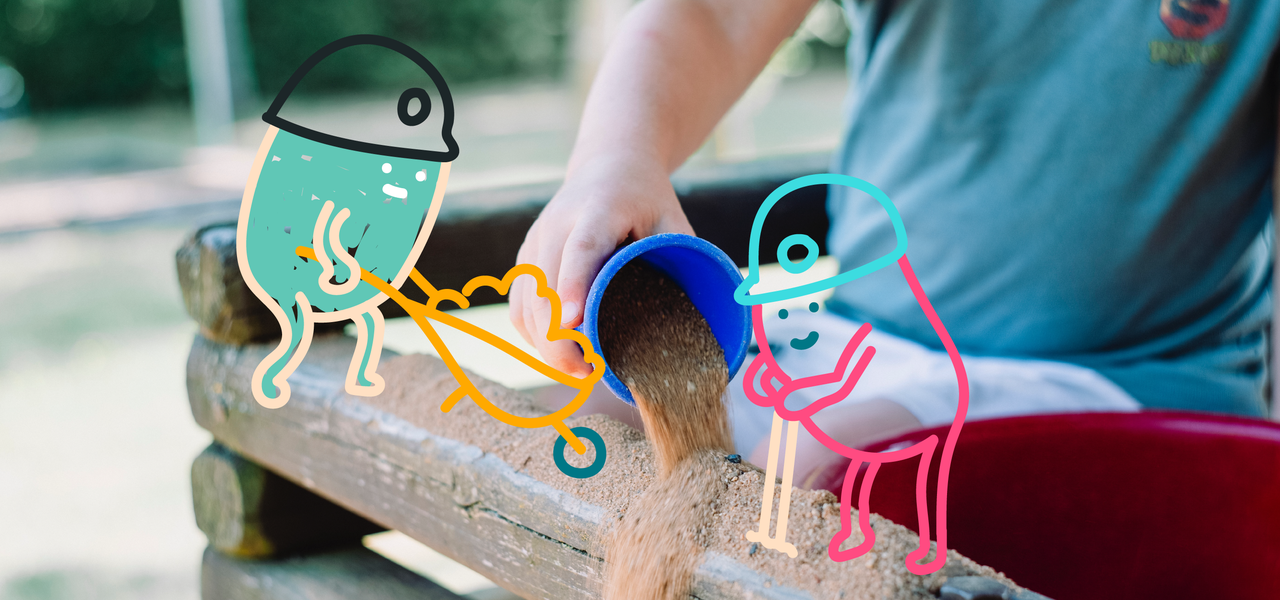
It’s so lovely watching children become completely immersed in play. This might be when they’re digging in the dirt, creating with play dough, dancing to their favourite song, finger painting, or picking flowers in the garden.
All of these types of activities are known as sensory play.
What is sensory play?
Sensory play refers to activities that encourage a child to make use of any of their five senses of sight, touch, taste, sound and smell.
It is play that helps children develop an understanding of the world, how things work, and helps to form neural pathways which will assist with brain development.
What are the benefits of sensory play?
By now you may be wondering exactly why is sensory play important for your little one.
The benefits of sensory play can be summarised as follows:
- Language: asking questions about the world, such as finding out ‘what happens to the water if I turn this cup upside down?’ teaches children the fundamentals of language.
- Learning and memory: they remember that last time they stomped through some dry leaves it made a satisfying crunching sound, and might try it again next time they encounter them.
- Problem-solving: being able to figure out how something works on their own is a powerful tool for children to tackle more complex problems down the track. Seeing what happens to ice over time, for instance, teaches children about the water cycle and the effect of heat.
- Motor skills: pinching and poking play dough helps build strength in their hands that will one day be able to tie shoelaces. Children often don’t realise just how many skills they are learning through sensory play - they just see it as fun.
- Social skills: interacting with other children while they engage in sensory play such as making some rice shakers teaches little ones about taking turns, sharing and talking to others.
- Stress relief: sensory play with water or threading beads can be beneficial for calming down an anxious child. Having something to focus on outside of their thoughts seems to help.
Sensory play and brain development
One of the key benefits of sensory play for children is in relation to brain development. This is the reason that you’ll see sensory play as such a big part of child care centres, as they understand that this is a critical period of development for children.
The first years of life are a time of huge growth in the brain. According to Parenting For Brain, children are born with around 50 trillion synapses, and by age three they have 1000 trillion synapses. A child that learns by using all of their senses will retain more information from the experience and remember it later.
20 sensory play ideas for your child
There are many great sensory experiences that are enjoyed at child care centres that parents can easily replicate at home.
- Finger painting
- Sensory bags – filling bags with sand or clay for example
- Planting seedlings in the garden
- Ice exploration
- Smelling scented objects - such as candles, flowers, fruit
- Rice bottle shakers
- Musical statues
- Wet vs dry sand in a tub
- Icing a cupcake or biscuit
- Paper mache
- Sorting through shell collections
- Playdough - you could add sand for texture or essential oils for scent
- Painting the fence with water
- Shadow puppets
- Mud play in the garden
- Blowing bubbles
- Having a dance party
- Cooking and baking
- Potato printing
- Large tubs filled with coloured dry rice or cooked pasta
Setting up a sensory environment for toddlers
Demi is an educator from Kindalin Kellyville and works as the coordinator for a room of busy children under two. ‘Sensory play is a fun experience for the children to explore their senses and the world around them, inspiring their curiosity and enhancing their learning and creativity!’ she explains.
‘Sensory play fosters curiosity, imagination and exploration,’ says Demi. ‘It also promotes fine motor development as children use their hands to feel and explore, such as texture and temperature.
Children are able to express their creativity and imagination as they explore and discover more about both the material as well as themselves,’ she said.
Sensory play for your toddler doesn’t need to be difficult or require fancy equipment. ‘So many daily activities are sensory experiences for children,’ says Demi.
‘Especially at a young age, a child playing with their food is a sensory experience, as they are exploring the texture and consistency of their food. Bath time is another time for sensory play with water.’
When it comes to sensory play for toddlers at child care, Demi believes that children love the freedom they have to make mess.
‘Children are more careful at home and are able to be messier at childcare,’ she explains. ‘Also, children love engaging and sharing interactions with their peers.’
How does sensory play tie in with The Early Years Learning Framework (EYLF)?
According to the ABC, sensory play delivers on outcome 4 of the EYLF, as it seeks to create confident and involved learners.
It makes children curious about how things work, makes them creative thinkers with a great imagination, teaches them problem-solving skills and inspires them to question the status quo.
They can also take the skills they’ve learned in one area and adapt them to other areas of their life.
Sensory play and your child
Now that you understand the benefits of sensory play, you can rest easy knowing that your child care centre builds this type of play into their programs every day.
If you need child care for your little one, browse the available options in your area by entering your postcode in the search box at the top of this page.
Toddle takes the hassle out of finding child care, with all of the options available in one place.